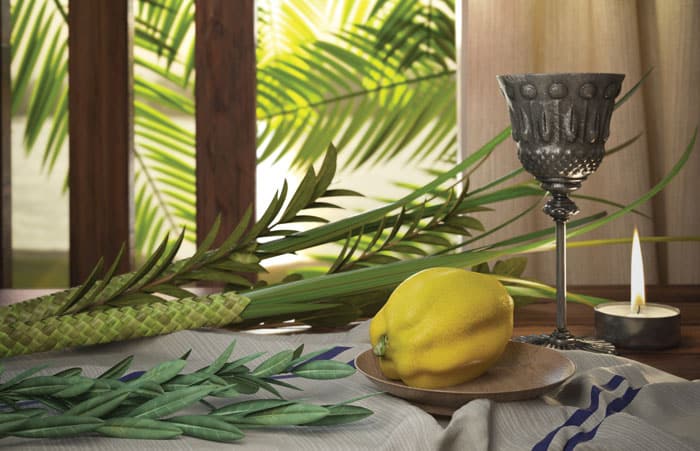
Why is it that most Jews will celebrate Passover but not Sukkot? After all, they both share, along with Shavuot, the elevated status of pilgrimage festivals (shalosh regalim), where in ancient times Jews would travel to Jerusalem and offer sacrifices at the Temple.
It’s not for lack of divine pedigree: Sukkot is biblical in origin and is described in the Book of Numbers.
At a time when so many of us are concerned about climate change and protecting our environment, Sukkot reconnects us with the priceless value and fruits of nature.
It’s not for lack of relevance: At a time when so many of us are concerned about climate change and protecting our environment, Sukkot reconnects us with the priceless value and fruits of nature. As Rabbi Lori Shapiro writes in our cover story this week, Sukkot is “a shared experience of earthly delights” that “returns us to the sensual pleasures” of everything nature has to offer.
It’s not for lack of spiritual and social meaning: Eating inside a frail sukkah reminds us of our vulnerability. It makes us humble and grateful for having such basics as food and shelter. It reminds us of the less fortunate who don’t have those basics and who need our assistance.
And it’s certainly not for lack of fun: There’s something inherently festive about the very act of building a frail hut next to our homes where we will share meals with family and friends. It’s like building these little forts in our homes when we were kids, except that now we’re adults and we’re building it outside. Part of the communal fun of the festival is “sukkah hopping” to visit other sukkahs in the neighborhood.
If Sukkot, then, is so biblical, relevant, meaningful and enjoyable, why hasn’t it gained much traction in the non-Orthodox world, especially among the Reform community?
Part of the answer, I think, is that we get too attached to labels. Building a sukkah feels like one of those hardcore rituals better left to the more observant. While there are plenty of non-Orthodox Jews who observe the festival, Sukkot is still seen by mainstream Jewry as more of an “Orthodox” holiday.
The irony is that it’s a conversation with a prominent Reform rabbi that made me think of writing this column. On a recent episode of my podcast, Rabbi Steve Leder of Wilshire Boulevard Temple uttered a word so raw that I don’t recall ever hearing it from another rabbi: boredom.
“The biggest threat to the future of Judaism,” he said, “is boredom.”
It’s one of those ideas that is so true no one feels a need to even mention it. I mean, how could it not be true? I’ve never met a human being — Jew or otherwise — who is craving to be bored.
Leder’s broader point was that synagogues and Jewish leaders have to up their game in this post-COVID world and offer a Judaism that is not just inspirational and meaningful, but also stimulating. Judaism will survive, and possibly even thrive, if it becomes an antidote to boredom.
Seen in that context, the festival of Sukkot may be just what the doctor ordered.
Unlike the more mainstream Passover, Sukkot is more demanding. It’s not just a gathering around a table; it’s more of an adventure. Whether you buy one of those easy-to-assemble sukkah kits, or go to Home Depot and create your own, the ritual of setting up a sukkah is an involved process that requires teamwork, both to set up and to decorate.
But that is part of its value: the work we put in. The more time we invest in any ritual, the more satisfaction and enjoyment we will get back.
It all comes together in that magical moment on the first night when you finally enter the sukkah and see the fruits of your labor. This is not dining al fresco; this is dining inside the huts of our biblical ancestors as they wandered in the desert.
It all comes together in that magical moment on the first night when you finally enter the sukkah and see the fruits of your labor.
This is not dining al fresco; this is dining inside the huts of our biblical ancestors as they wandered in the desert. This is dining when you can barely see the stars through the palm fronds on the roof, and where the only sturdy thing is the table. This is dining where you might even say to yourself, “Are we really doing this?”
And then you might answer: “Why not?”
If you’ve never celebrated Sukkot before, I can’t think of a better year than the year we emerge from nearly three years of COVID isolation, the year we’re craving anything but boredom.
“This year,” Shapiro writes, “Sukkot is a call to all of us to get out and live again. It’s a call to have people over, return to the sensual pleasures of redolent fruits and tactile handling of plant species. It’s the clarion call to return to the roots of community.”
Of course, before you start the adventure, you’ll need to remind yourself that, regardless of religious labels, this quirky and ancient Jewish holiday belongs to you.























 More news and opinions than at a Shabbat dinner, right in your inbox.
More news and opinions than at a Shabbat dinner, right in your inbox.